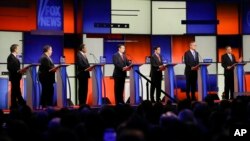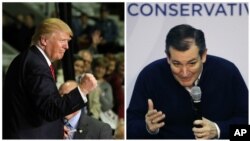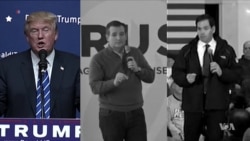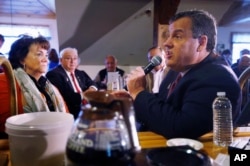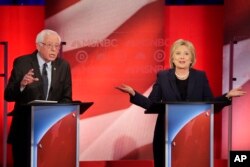Seven Republican presidential hopefuls have another debate in New Hampshire Saturday night, less than three days before the northeastern U.S. state’s primary election, when voters will deliver a verdict that could cut short several candidates’ campaigns.
Billionaire real estate tycoon Donald Trump skipped a debate last week in a dispute with the television network handling the broadcast. His tactics were widely criticized, but it is not clear whether his standing among voters has weakened.
Trump also is taking the stage Saturday night somewhat chastened by his second-place finish in Iowa’s voter caucuses on February 1 — a measure of gauging voter sentiment about presidential candidates that is similar to, but more complicated than primary elections.
Texas Senator Ted Cruz won the Iowa caucus, with Trump finishing in second place, barely ahead of Florida Senator Marco Rubio, the youngest candidate in the Republican field. Trump, Cruz and Rubio all are competing for votes from the most conservative factions of the Republican Party, but Rubio’s popularity has risen sharply this month, and his debate performances will be closely watched.
WATCH: Top three Republican contenders speak out
Former governors
Other Republicans on the debate stage are three present or former state governors — John Kasich of Ohio, Chris Christie of New Jersey and Florida’s Jeb Bush, who is the son and brother of two former presidents — along with retired neurosurgeon Ben Carson.
Former corporate executive Carly Fiorina was excluded from the main debate because her standing in opinion polls is too low, in the judgment of debate organizers. She has protested this is unfair, but it is unlikely the television network organizing the debate will revise its plans.
The race for the Democratic presidential nomination also is on the ballot in New Hampshire on Tuesday, but the two main candidates — former Secretary of State Hillary Clinton and Vermont Senator Bernie Sanders — have no more face-to-face meetings on the last weekend before the primary.
Democrats slugging
Clinton won the Iowa caucuses by an extremely narrow margin over Sanders, but the liberal senator who describes his politics as “democratic socialist” has a huge lead heading into the next vote.
Sanders, who represents the neighboring state of Vermont, has been up to 20 percentage points ahead of Clinton, according to public opinion surveys.
Saturday’s debate is already the 12th direct meeting of the main candidates for the Republican presidential nomination — eight debates and four “forums,” which have a slightly different format — since last year. More confrontations among the candidates lie ahead before the two main parties’ conventions, still five months away, and the final round of campaigning before the general election in November.
The winner in November will succeed President Barack Obama and become the 45th elected president of the United States in January 2017.




